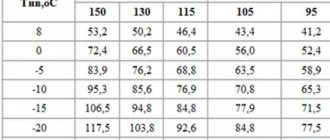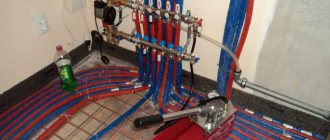The amount of utility bills that consumers are forced to pay increases every year. It is not surprising that the share of these payments in the total expenses of Russian citizens is also steadily increasing. The logical consequence is the desire of the majority of consumers of housing services to use any possible opportunity to reduce the amount of amounts transferred to various utility services.
The legislation in force in the housing sector establishes the possibility of recalculating the amount of required utility payments in three cases:
- if services were provided of inadequate quality and not meeting regulatory requirements;
- if there is a break in the provision of services that exceeds in duration the norms established by the Housing Code;
- if a citizen is absent from the premises he occupies for a certain period of time.
All of the listed cases, in the event of which accrued utility bills may be recalculated, often occur in practice, but the last option is the most common. The Housing Code currently in force, as well as other legislative acts, regulate the procedure for recalculation and the mechanism for reducing the amount of payment that the consumer must make.
Recalculation of utility bills in the absence of a tenant
As noted above, the most common case when a consumer can exercise the right to recalculate the amount of utility bills is his prolonged absence from his place of residence. If this time period is more than 5 days, then certain actions should be taken established by the Procedure, which is approved by the relevant Government Resolution:
- contact the management company;
- write a statement about the need to recalculate. A sample application is in the photo below;
- attach documents confirming your absence.
- They may be:
- a copy of the business trip certificate;
- certificate of completion of treatment;
- travel documents in the name of the consumer and confirmation that the consumer has used the passage (boarding pass);
- hotel bill;
- certificate of study;
- document on temporary registration in another locality, etc.
There are two points to consider:
- the payment accrued for general house needs is not subject to recalculation in any of these cases. Thus, the obligation to make payments for general house needs does not depend on direct residence in the apartment;
- services for such types of payments as heating and gas supply, which is produced for the purpose of heating, also cannot be recalculated.
Adjusting heating fees: step-by-step instructions
| Executor KU | Period | Thermal energy consumption according to ODPU readings | Accrued for the period January-August 2022 to owners of residential and non-residential premises | Amount of annual adjustment according to MKD | Amount of annual adjustment according to MKD | ||||
| Gcal | rub. | Gcal | Rub. | Gcal | Rub. | Gcal | Rub. | ||
| UK | January | 452,179 | 946103,17 | 204,6273 | 428 145,79 | 247,5517 | 517 957,37 | 635,3721 | 1 329 401,75 |
| February _ _ | 451,181 | 944015,03 | 204,6273 | 428 145,79 | 246,5537 | 515 869,24 | |||
| March | 345,894 | 723720,9 | 204,6273 | 428 145,79 | 141,2667 | 295 575,14 | |||
| MUP UIS | April | 239,3 | 500692,18 | 204,6273 | 428 145,79 | 34,6727 | 72 546,38 | -680,3405 | -1 440 613,25 |
| May | 103,496 | 216546,75 | 204,6273 | 428 145,79 | -101,1313 | -211 599,04 | |||
| June | 0 | 0 | 204,6273 | 428 145,79 | -204,6273 | -428 145,79 | |||
| July | 0 | 0 | 204,6273 | 436 707,40 | -204,6273 | -436 707,40 | |||
| August | 0 | 0 | 204,6273 | 436 707,40 | -204,6273 | -436 707,40 | |||
| Total for January-August | 1 592,05 | 3 331 078,03 | 3 331 078,03 | 3 442 289,60 | -44,9684 | -111 211,50 | -44,9684 | -111 211,50 | |
Calculation procedure.
The calculation principle and initial data are similar to the previous example. All initial data can be obtained from the receipts that were provided to you, or obtained from the management organization or from the MUP UIS.
Step one.
First, let's determine how much the residents of the house owe to the management company, which issued invoices from January to March.
To do this, we look at how much thermal energy the house consumed in January, February and March. From table No. 2 we see that in January the house consumed thermal energy in the amount of 946,103.17 rubles, in February - in the amount of 944,015.03 rubles, in March - 723,720.9 rubles. These amounts are calculated using the same formula as in the first example (i.e. 452.179 Gcal (real consumption at home in January) x 2092.32 rubles (cost of 1 Gcal) = 946,103.17 rubles. That is, from January to March, the house actually consumed thermal energy in the amount of 2,613,839.10 rubles. Step two.
Next, we look at how much thermal energy the house actually consumed from April to August, when the utility service provider was MUP UIS. From table No. 2 we see what these For months, the house actually consumed thermal energy in the amount of 717,238.93 rubles (in April - in the amount of 500,692.18 rubles, in May - 216,546.75 rubles, in June, July and August no heat was supplied to the house)
. The
column "Accrued for the period January-August" in table No. 2 shows what amounts were billed to the owners of the house by the management company from January to March and by the MUP UIS from April to August. We remind you that before the start of the heating period 2019-2020 (until September 2019) the calculation was based on 1/12, i.e. the total heat consumption in the house during 2022 was divided into 12 months and billed in equal shares.
Thus, the management company received 1,284,437.37 rubles from the owners in January-March. (RUB 428,145.79 for each month). MUP UIS received - 2,157,852.17 rubles. (428,145.79 rubles each from April to June and 436,707.40 rubles for July and August, because from July 1, 2019, the tariff was indexed, the cost of 1 Gcal became 2,134.16 rubles) Step four.
We found out that in January-March the management company received 1,284,437.37 rubles from the owners of premises in the building.
At the same time, the actual consumption of thermal energy for these months was in the amount of 2,613,839.10 rubles. 2,613,839.10 – 1,284,437.37 = 1,329,401.75 rubles. Those. the owners owed the management company 1,329,401.75 rubles for thermal energy. For municipal unitary enterprises, the situation is different. 2,157,852.17 rubles were billed, while the actual consumption of thermal energy was in the amount of 717,239 rubles. Those. MUP UIS owes residents 1,440,613.25 rubles. Step five.
It turns out that residents must pay an additional 1,329,401.75 rubles.
management company, while MUP UIS must return 1,440,613.25 rubles to them. 1,440,613.25 - 1,329,401.75 = 111,211.50 rub. Total: 111,211.50 rub. should return the MUP UIS to the residents of the house. Step six.
We calculate the refund amount per 1 sq.m.: 111,211.50 rubles.
(total refund amount) / 15,009.7 sq.m (house area) = 7,409 rub./sq.m. Step seven.
All that remains is to multiply the area of a particular apartment by 7,409 rubles/sq.m. For example, for an apartment with an area of 54.8 sq.m. the total refund for the heating fee will be: 54.8 sq.m x 7.409 = 406.03 rubles. That is, in January 2022, the MUP UIS will return 406.03 rubles to the residents of this apartment.
If you have any questions, you can send them by email, ask by multi-channel phone 8-800-250-52-80 (free call from mobile and landline), or by WhatsApp: +7-917-360-05- 10 (not intended for calls). The sales service of MUP UIS is located at the address: Ufa, 50 Let Oktyabrya Street, building 15 (entrance from Ibragimov Boulevard). Opening hours: Monday-Friday: 8:30 – 21:00; Saturday: 10:15 – 19:00; Sunday is a day off.
*In connection with the entry into force of the Decree of the Government of the Republic of Bashkortostan dated September 30, 2022 No. 596 “On amendments to some resolutions of the Government of the Republic of Bashkortostan”, from the beginning of the 2019-2020 heating season. The method of payment for heating utilities has been changed from uniform throughout the year (1/12) to payment during the heating period (1/8).
Recalculation of subsidies for utility bills
In the case when a consumer recalculates the amount of payments for utility services associated with his long-term temporary absence, it is also necessary to take into account the following several important points.
Firstly, if he receives a subsidy for utility payments, you should know that it should not exceed the actual amount paid by the consumer. Each reporting period it is necessary to compare the indicated payments. If the amount of the subsidy turns out to be more than the amount of utility bills after recalculation, the excess funds should be counted as a subsidy for the next reporting period.
Secondly, the problem of the need to recalculate can be quite simply solved by installing individual metering devices in the apartment, allowing the consumer to pay only for the utilities actually provided. In addition, this measure allows, in most cases, to significantly reduce the transferred amounts when living in an apartment.
New rules for recalculation of utility bills: main changes
We pay for utilities and, of course, have the right to ensure that they are of high quality. And if, let’s say, instead of hot water, cold water flows from the tap, and even with a bright shade of rust, it’s not us who should pay for it, but us.
Let's consider the latest changes in laws and judicial practice in the rules for recalculation of utility bills.
Further amendments to the Housing Code of the Russian Federation have been adopted
On October 27, 2022, the Law amending Art. 157 Housing Code of the Russian Federation (No. 351-FZ).
According to the new edition, recalculation for low-quality utility services will be made by the management organization or resource supply organization (if the consumer has a direct contract with it).
These organizations must figure out among themselves independently (who should compensate whom for losses due to poor quality services). Citizens need to file a claim with the person who directly provides them with the service.
In order not to pay for cold batteries or dirty water, we adhere to the following algorithm of actions:
1. We call the emergency dispatch service of the management organization and leave a request for poor quality service.
We ask for the number under which your application was registered in the journal. Or you can submit a written application addressed to the head of the company in person (through the reception desk) or by registered mail with notification.
2. The management organization must call you and agree on a time for the inspection.
The law does not prohibit the consumer from filming the inspection process in order to provide himself with evidence in case of a legal dispute. The inspection report is issued to the applicant.
3. If the result of the inspection does not satisfy you (it often happens that when the inspectors arrive, everything is in order, and then problems begin again), you can apply to the housing inspectorate for a repeat inspection, with the participation of their specialists.
4. You can attract an independent expert to check the quality of housing and communal services. The date and place of the inspection must be reported to the managing organization, since they have the right to monitor the progress of the examination.
If a low-quality service is confirmed, the costs of paying for the examination are borne by the management organization.
The conclusion that a utility service is supplied in violation of quality standards is the basis for recalculating the rent. The official requirements for the quality of housing and communal services are given in the Appendix to the Rules for the Provision of Public Utilities, approved. RF PP No. 354.
The downside of the new law is that it abolished fines for low-quality housing and communal services in favor of consumers. Now you can only receive recalculation and compensation for moral damages from utility companies (if the case goes to court).
The Ministry of Construction explained how much utilities owe consumers if cold water flows from a hot tap
This issue is addressed in the letter of the Ministry of Construction dated June 29, 2022 No. 20156-OG/04.
If the hot water temperature does not rise above 40 °C, then the resource supplier must charge the cold water tariff for each hour.
If the hot water temperature is above 40 °C, but still does not reach the standard, then for every 3 °C deviation from the standard, the monthly fee for hot water should be reduced by 0.1% for each hour of such violation.
Let me remind you that according to sanitary requirements, the temperature of hot water should be no lower than 60 °C and no higher than 75 °C (SanPiN 2.1.4.2496-09). A deviation of a maximum of 3 °C during the daytime and 5 °C at night is allowed (from 0.00 to 5.00 hours). Large deviations already require recalculation.
The Supreme Court of the Russian Federation abolished the statute of limitations rules for disputes regarding recalculation of rent
By ruling No. 301-ES20-13171 dated September 23, 2022, the Supreme Court of the Russian Federation confirmed that the management organization in disputes with tenants regarding the recalculation of rent cannot refer to the omission of the 3-year limitation period.
The management company was obliged to recalculate the heating fee taking into account the readings of the common building meter (whereas they charged the fee according to the standard if the meter was working).
The initial period for recalculation was set at 2015, i.e. beyond the 3-year statute of limitations. According to the Criminal Code, the court should have recognized the recalculation as legal only for the last 3 years.
However, all authorities, right up to the Supreme Court of the Russian Federation, agreed that in such disputes the rules of limitation cannot be applied (since these are not civil law, but administrative legal relations). Recalculation must be made for the entire time when rent was calculated incorrectly.
ANNUAL REPORT 2021
Find out when to make transitional entries according to the new Federal Accounting Standards so that they are not included in the reporting for 2022.
Only on February 4, a step-by-step analysis of filling out the annual report taking into account the new Federal Accounting Standards at a large webinar with one of the best speakers on accounting, auditor, chief methodologist of Energy Consulting Group A. Rabinovich.
Sign up>>>
Changes to the heat supply system must be approved by the local self-government body and included in the technical documentation
By filing an appeal, the owner of the premises tried to prove that the heating system in his premises was rebuilt in accordance with the procedure established by law.
He indicated that the heating radiators were closed by the organization managing the house and seals were installed, and the pipelines were insulated, and ventilation with a heater was installed in the room as an alternative to the centralized heating system. Consequently, the district heating service was not provided to him.
The Court of Appeal, considering the complaint, noted that the house in which the defendant’s non-residential premises are located has a single building-wide heating system. The owner of the premises did not provide evidence that his premises are structurally located separately from the multi-apartment residential building and do not have common engineering systems with those in the building or have a separate insulated thermal input.
The consumer does not have the right to arbitrarily dismantle or turn off the heating elements provided for in the technical documentation of the house, or make changes to the in-house engineering systems (clause 35 of RF PP No. 354).
Any intervention in the general building engineering networks requires an agreed project and changes to the technical documentation of the house. According to Part 1 of Art. 26 of the Housing Code of the Russian Federation, the reconstruction is carried out in compliance with the requirements of the law in agreement with the local government body.
When heating radiators are disconnected in the premises, the placement of which is provided for in the technical documentation, the consumer may be exempt from paying for heat supply services only under one condition: if he provides evidence that this was done in compliance with the approval procedures with local self-government bodies. The approval of the management organization or the acts of other specialists does not matter.
The Court of Appeal upheld the first instance decision. The Court of Cassation confirmed this position, and the Supreme Court of the Russian Federation did not consider the complaint, agreeing with its colleagues.
The consumer may be exempt from paying for indoor heating if the radiators are legally dismantled
An important circumstance in the court case was also that the radiators in the room were not dismantled: they were only blocked off. This did not allow the owner to appeal to the legal position of the RF Armed Forces, set out in the ruling dated August 30, 2016 No. 71-KG16-12.
In this determination, the Supreme Court of the Russian Federation noted that the fact that networks pass through a non-residential premises in the absence of heat-receiving devices does not provide grounds for collecting heating fees from the owner. Since the heating radiators were not dismantled in the premises of the individual entrepreneur, the court of first instance did not take into account the reference to determination No. 71-KG16-12.
Having examined each argument of the owner, the court came to the conclusion that the contractor has the right to recover from the consumer the entire amount of debt and penalties for late payments.
Huge utility bill: how to prove a mistake
Utility fees can be calculated based on meter readings, average values, and standards. The standards for the consumption of utilities, taking into account average monthly data, were determined by the Ministry of Construction. According to his information, the average resident of an apartment in Russia takes a shower 25 times and takes a bath four times a month.
But sometimes the numbers of resource consumed turn out to be far from “normal”. So, in a month, a resident of Lyubertsy found himself owing more than 180,000 rubles for utilities. The most expensive item of expenditure was water. For cold and hot water, as well as sewerage, the cost was 164,000 rubles. Water consumption for the month amounted to 1,200 cubic meters. m., this is usually what public institutions need. The reason, as it turned out, was a failure in data transmission, reported the Moscow Region Today publication. Inconsistencies began after the Lyubertsy City Housing Trust (LGZhT JSC) entered into an agreement with MosOblEIRTS on organizing payments for housing and communal services.
1,200 cu.m. m
these are 66 small pools
In such a situation, the subscriber has only one choice - to prove that the amount in the receipt was charged in error. Ivan Bychkov, head of the Tyumen branch of the Bureau of Lawyers Bureau of Lawyers "De Jure" Bureau of Lawyers "De Jure" Federal rating. group Arbitration proceedings (medium and small disputes - mid market) group Bankruptcy (including disputes) (mid market) group Dispute resolution in courts of general jurisdiction group Family and inheritance law group Criminal law group Natural resources/Energy group Land law/Commercial real estate/Construction 8th place by number of lawyers 13th place by revenue per lawyer (more than 30 lawyers) 15th place by revenue Company profile identifies the three most common reasons for overestimation of the amount in receipts: meter error, payment agent error or user error who transmits incorrect data or misses the deadline for checking instruments accounting.
What to do if the user is at fault
If a user deposited money for a utility bill, but made the wrong invoice, the error can be easily corrected, explains one of the management companies: you need to contact either the bank or the owner of the payment terminal with a check, fill out an application to cancel the erroneous transfer and redirect the money to the correct personal account number ( banks have a sample). There are situations when the owner makes a mistake not in the account number, but incorrectly indicates the data on consumed resources.
Example:
The receipt from a resident of the Moscow region indicated that she owed 68,000 rubles for the resources consumed, and 49,000 rubles. she was charged for hot water. It turned out that when giving her testimony, the woman put a comma in the wrong place. Instead of 2.770 cubic meters, she wrote 277.0.
Bychkov says that such a problem can be solved by contacting the management company. After this, the management company will send an employee who will take meter readings and make a recalculation based on this data.
If you do not submit meter data on time, you can also receive a receipt with an unusually large amount. In such situations, Alexander Titov, lawyer, National Legal Service AMULEX National Legal Service AMULEX Federal rating. , also offers to initiate a counter check. It is important that the device has all the seals and is in good working order. For example, in case No. 33-28813/2020, a consumer who was late in submitting meter readings was able to obtain a recalculation of the fee based on the data that was taken during the inspection of the meter.
Problem counter: how to avoid additional charges
If it turns out that there are problems with the meter, then Bychkov advises paying attention to how the management company will calculate the consumed resource in such a situation - according to the average value or according to the standard. Within three months, the calculation should be based on the average value; it is usually more profitable for the owner. “The meters show that residents spend much less water and light than is stipulated in the standards. So when calculating according to the standard, the fee is usually higher,” said a representative of Russian Utility Systems.
If an excess fee was charged due to missing the deadline for checking the meter, then the management organization will be in the right. So, Irina Averkova* was due to check her water meter, but she forgot about it. And for another two years I paid according to my testimony, but then Vodokanal found out about it. He recalculated the resource consumed. It turned out that Averkova owes almost 122,000 rubles. The plaintiff recovered the entire amount through the court (case No. 33-5985/2019, entered into force).
What to do if the management company made a mistake
Example.
“Our entire house received debt receipts at once,” a Moscow resident wrote on Facebook in the summer of 2020. According to her, these were debt notices for July 2022. And a resident of Zvenigorod on her page complained about heating bills: she was charged 4.07945 Gcal for heating, although according to the meters she consumed half as much - 1.9177 Gcal.
In such situations, you first need to calculate the actual amount of the payment. The owner can come with a payment slip to the management organization and demand clarification on each line:
- why this or that line is included;
- what are the standards and tariffs (why is this size, when, by whom was it approved, for what category of apartment buildings);
- what formulas were used to make the calculations?
Most likely, after calculation, the figure will turn out to be more familiar than the impressive amount indicated on the receipt. Then you can submit a claim for recalculation to the management company or HOA that services the house, or to the agent for receiving meter readings.
Claims due to inaccuracies in calculations can usually be resolved at this stage. The paying agent or organization chosen by your home as a form of management, if it discovers an error, can immediately recalculate.
Ivan Bychkov, head of the Tyumen branch of the BA Bureau of Lawyers "De Jure" Bureau of Lawyers "De Jure" Federal rating. group Arbitration proceedings (medium and small disputes - mid market) group Bankruptcy (including disputes) (mid market) group Dispute resolution in courts of general jurisdiction group Family and inheritance law group Criminal law group Natural resources/Energy group Land law/Commercial real estate/Construction 8th place by number of lawyers 13th place by revenue per lawyer (more than 30 lawyers) 15th place by revenue Company profile
In some cases, Bychkov continues, the Criminal Code may send a specialist to check the integrity of the seal and the serviceability of the meter and record the readings taken in the report. And based on it, adjustments are made.
If the management company or the HOA do not cooperate, you must file a complaint with the State Housing Inspectorate. Payments with which you do not agree must be attached to the application. Upon request, the housing inspection will be required to conduct an unscheduled inspection. If it discovers a violation, it will oblige the management company to recalculate. Bychkov recommends simultaneously sending the same complaint to the prosecutor's office.
According to Art. 156 of the Housing Code (“Amount of payment for residential premises”), if the procedure for calculating payment for housing maintenance is violated, the service provider is obliged to pay a fine to the owner of the premises (50% of the difference between the amount calculated by mistake and the correct amount), reminds Alexander Titov, lawyer at the National Legal AMULEX Service National Legal Service AMULEX Federal rating. . You must send a written application to the Criminal Code. Within 30 days, the company must check the accrual and make a decision on payment if it finds an error.
What if the reason is in the meter?
Example.
A resident of Moscow decided to reinstall the gas stove, called a technician, and he did everything without any complaints. And at the end of the month, the owner received an astronomical gas bill - 600,000 rubles.
There are many similar stories: for example, the water meter increased 60 cubic meters. m and even 180 cubic meters. m instead of the usual 2–3, or the electricity meter showed readings ten times higher than a month earlier. Companies that test and install water meters identify several typical faults that can affect meter readings:
- depressurization of the device;
- leaks;
- blockage in pipes;
- breakdown of the counting mechanism;
- incorrectly selected metering device;
- incorrect installation.
The situation is similar with gas meters. The device may show incorrect data in the following cases:
- breakdown of mechanisms;
- incorrect installation;
- Installation in the wrong location (for example, exposed to direct sunlight).
As soon as the owner realizes that something is wrong with the accounting partitioning, he must notify the management company (MC) or resource supply organization (RSO), says Titov. You need to ask them to check the meter. If the specialist confirms that it is faulty, then the resource will be accrued by calculation. But sometimes the owners find out that the meter was giving erroneous readings when they receive a receipt with a round sum. Bychkov says that in this case it will be necessary to conduct an independent examination of the meter.
Documents that need to be submitted for examination:
- technical passport of the meter;
- acceptance certificate;
- documents on previously conducted examinations;
- reports on repairs performed;
- data on technological indicators;
- information about existing failures or problems.
If the expert confirms that the meter is faulty, the service organization will have to recalculate the accrued amount, explains Bychkov. If the RSO or the Criminal Code does not do this, you will have to seek through the court a recalculation of the fee (exclusion from the personal payment account) for utilities.
Residents against high prices: how to save on utilities and defend your rights
Georgy Borichev* filed such a claim against the Yubileiny-6 housing cooperative. He disputed the accrual of almost 115,000 rubles. for water and insisted that the water meters in his apartment were faulty. This was confirmed by the organization for verification of measuring instruments: according to the expert, the error of the instruments is three times greater than the norm, which means they are faulty.
The first instance sided with the owner and not only ordered the housing cooperative to carry out a recalculation, but also exacted compensation for moral damages, a fine and expenses for a representative in favor of the consumer. But the appeal overturned this decision, deciding that Borichev should pay the invoice. The owner of the apartment is appealing the decision in cassation (case No. 2-1159/19).
A claim for an obligation to recalculate is a rather exotic way of protecting rights, and it does not always work, says Sergei Sergeev, head of practice in the field of housing and communal services, ecology and environmental management of the Moscow Bar Association "Arbat" Moscow Bar Association "Arbat" Federal rating. . He gives other advice.
It is better not to pay an amount that you do not agree with, but instead wait for RSO to file a lawsuit. And already in the process you can seek to cancel the accrual.
Sergey Sergeev, head of practice in the field of housing and communal services, ecology and environmental management MCA Moscow Bar Association "Arbat" Moscow Bar Association "Arbat" Federal rating.
The court, according to the expert, will evaluate the actions of the parties in good faith: how quickly they responded to the situation and whether there was any abuse of law. The second way for the subscriber is to pay the amount on the receipt in full, and then recover the money from the resource supplying organization as unjust enrichment.
*Names and surnames have been changed by the editors
- Anastasia Sinchenkova
Annual recalculation for heat. Let's understand the nuances
For whom is recalculation relevant?
Residents of not all regions receive recalculation for heat. In our country there are two options for paying for heating:
- In fact
, that is, according to the readings of the general house heat meter, and only during the heating season. - Equal amounts every month
, even in the summer, when there is no heating. This calculation system is called “1/12”. It allows you to distribute utility bills evenly throughout the year and avoid their sharp increase during the heating season.
Recalculation is applied where the “1/12” settlement system is in effect.
How exactly to pay is decided by regional authorities. For example, in Kemerovo, Novokuznetsk, Novosibirsk, Nazarovo the “1/12” payment system operates, but in Kansk and Biysk they pay for heat after the fact, which means they do not receive any recalculations. 2020 will be a transitional year for the heat payment system in Krasnoyarsk. Until August inclusive, Krasnoyarsk residents pay according to the old scheme - in equal installments of 1/12, and therefore at the beginning of 2022 an adjustment will be made for the first eight months of 2022. She will be the last. From August 2022, consumers in Krasnoyarsk will begin to pay for heat upon delivery. All the details are here.
Which houses receive recalculation?
Let us immediately clarify that SGK does not make annual recalculation for heating to all houses, but only to those where there are common house meters. They are installed in high-rise buildings and count all the heat that the house consumes during the year. The management company (MC) records the heat meter readings every month and transmits them to the SGC. Houses without meters always pay according to the standards approved by the authorities.
How to recalculate
When the year ends, SGK specialists compare the volume of heat recorded by the meter with what residents paid for 12 months and convert it into rubles (at the established tariff). The resulting difference is divided among all owners in proportion to the area of the apartments.
In the first quarter, residents receive a payment recalculated for the previous year.
It can be in two versions:
- Plus. You need to pay extra,
since the actual consumption at home turned out to be more than the volume for which they paid for the whole year. - In minus. There was an overpayment
, since during the year the residents paid more than what the house actually consumed. In this case, the amount of overpayment is deducted from the bills, residents will be able to pay less for heat for some time.
But why can the same house go either negative or positive in different years? The point is the difference in the volumes of actual consumption for the calculated year and the previous one. Every year it changes, sometimes up, sometimes down.
What is average heat consumption
The average heat consumption of the current year is the fact of heat consumption in the past year, which is measured by a common house meter, divided into 12 equal parts
Real examples
For example, in 2022, a residential building consumed 444 Gcal in a year, which was recorded by the heat meter.
It was divided by 12 and received 37 Gcal. This figure became the average monthly consumption for a home for 2018, meaning residents paid for 37 Gcal every month of the year. But in 2022, the house actually consumed more heat - 498 Gcal. Therefore, in January 2022, residents received receipts with additional charges. At the same time, average consumption for 2022 also increased and became equal to 498/12 or 41.5 Gcal.
If a house actually consumes less heat in 2022, then in January 2022 people will receive savings on their receipts, and their home will receive a reduction in average consumption for 2022. If they consume more heat, they will again receive a recalculation with an additional payment, and the average consumption at home for 2022 will increase again.
In houses where communal heat meters are not installed, consumers do not receive recalculation bills; they simply pay 1/12. In Novokuznetsk, for example, within the Kuznetskaya CHPP circuit, 41% of houses without heat meters. In Kemerovo - less than 1%.
What affects heat consumption
Firstly,
the weather.
The colder the winter, the more heat the house consumes. The length of the heating season also affects the volume of consumption. Secondly,
the maintenance of the house. Heat consumption largely depends on the thermal insulation of the building. And here you can ask the management company: what has been done to avoid heat loss? How tightly do the doors in the entrance close, are there any cracks in the window frames, are the attics insulated, and so on?
Third,
heat consumption is increased by a decrepit general heating system: faulty valves on pipes, in the basement, lack of thermal insulation.
Each house has its own heating unit. It regulates the temperature and pressure of hot water that came from the thermal power plant. And if the equipment in it works properly, all parameters are precisely adjusted, then the heat in the house will not be wasted, and the residents will not freeze. The management company must maintain the heating unit, and apartment owners must demand that all procedures be carried out on time.
Management companies must monitor the serviceability of heat meters and promptly transmit their readings to the heat sales divisions of SGC
When recalculation “disrupts” the management company
There is another important point that affects the annual recalculation for heat. Problems may arise due to the fact that the management company untimely transmits readings from common house metering devices to a resource supply organization, for example SGK. The reason for this is most often a malfunction of the meters. The management company must again monitor their technical condition.
At the end of the year, recalculation will still be carried out. But for those months for which readings were not provided, average data or normative figures will be used. Both do not reflect real consumption.
Dear payers of housing and communal services!
Housing and communal services news in Kemerovo| December 2, 2022 |
| In Kemerovo, since the beginning of the year, 882 entrances in apartment buildings have been cleaned up as part of ongoing repairs. |
From December 2022, you have the opportunity to pay for services provided under direct contracts with owners/users of residential premises for the following services:
through partner banks (Sberbank PJSC, Uralsib Bank PJSC, VTB Bank PJSC, Post Bank JSC, Promsvyazbank PJSC, Bank FC Otkritie PJSC) and banking mobile applications. Please note that the amount of the recommended payment for the month already includes amounts for the specified services. From June 1, 2022, VTB has abolished fees for paying utility bills in VTB Online, the bank’s mobile application and ATMs. VTB clients can pay for services through a mobile application or VTB Online Internet bank. In the application, you need to go to the “Payments” section, enter “RIC” in the search bar and select the organization “RIC Kemerovo”, enter your personal account and click the “Pay” button. When making a payment, you can choose for yourself which months to pay for, as well as submit the readings of individual metering devices (meters). Fast, simple, convenient and profitable! More details on the VTB Bank website |
PJSC Sberbank has implemented a new service for paying for housing and communal services - at.
The service is available to all bank clients who pay for housing and communal services through the Sberbank Online service and mobile application, is easy to use and allows you to find all charges at the address of an apartment or house that are available for payment through Sberbank. To pay, you must select “Search by address” in the “Rent” section, enter the address and then fill out all the fields provided.
A search by address will allow you to immediately find all the charges: for rent, for gas, and for the intercom.
By connecting, bills will be paid automatically for the amount of the invoice, about which you will receive a monthly SMS notification. With this service, residents do not have to worry about timely payment of bills for housing and communal services and can devote their free time to their favorite activities.
Great news for all users of MP "RIC", for easier and faster payment of bills for housing and communal services, you can use the mobile application "Housing and communal services Kuzbass. Payment for the apartment." You just need to enter the address and pay the required amount. Fast, simple, convenient!
In the application you can pay utility bills, add several addresses, view payment history, and get complete information about your management company. In the near future it will be possible to transmit meter readings.
On a note
The issue of charging for heating in the premises of owners in apartment buildings has received a lot of attention since December 2022, when the Constitutional Court of the Russian Federation, in Resolution No. 46-P dated December 20, 2018, established that consumers with individual sources of thermal energy must pay only for the resource consumed for the purpose of maintaining common property.
However, the same resolution No. 46-P states that this applies only to those owners in whose premises the reconstruction of the heat supply system was carried out with the receipt of all permits. At the same time, all owners of premises in the house pay for the resource consumed to maintain the common property.
The case discussed above precisely implements the requirements voiced by the Constitutional Court of the Russian Federation that without registering the reconstruction in the manner prescribed by law, the owner is obliged to pay for centralized heat supply in full, even when installing autonomous equipment.











